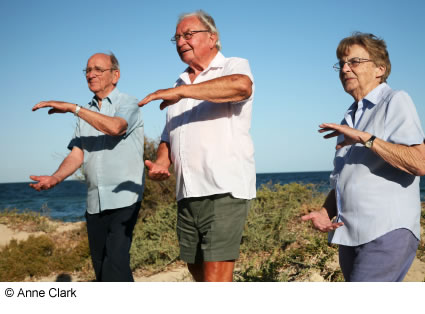 More than half of all older adults complain about having difficulties sleeping. Most don’t bother seeking treatment. Those who do usually turn either to medications, which can lead to other health problems, or behavior therapies, which are costly and often not available close to home.
More than half of all older adults complain about having difficulties sleeping. Most don’t bother seeking treatment. Those who do usually turn either to medications, which can lead to other health problems, or behavior therapies, which are costly and often not available close to home.
Â
Now, UCLA researchers report that practicing tai chi chih, the Westernized version of a 2,000-year-old Chinese martial art, promotes sleep quality in older adults with moderate sleep complaints. The study, which will be published in the journal Sleep, is currently available in the journal’s online edition.
Ageing
A new computer programme for cerebral stimulations improves intellectual performance among older people. A pilot study from the University of Basel presenting evidence to this effect is being presented at the European Neurology Congress in Nice. It also shows how large the capacity of the brain to reorganize itself still is in the elderly.
A new computer based training programme can slow the loss of cognitive ability. The results of a pilot study to this effect are being presented by Dr. Iris Katharina Penner, associate professor at the institute for general psychology and methodology at the Psychology Faculty of the University of Basel (Switzerland), at the European Neurological Society Congress in Nice. [continue reading…]
Today, one out of very 12 people aged 65 and older will experience a decline in their ability to remember, think clearly, reason and make daily decisions. The decline in memory and mental abilities may be subtle, but it limits quality of life and oftentimes leads to depression.Misericordia University researchers are leading a team of students and faculty from two regional institutions of higher education in a six-month study to better understand how to treat people with memory problems and who have a decreased ability to think clearly. [continue reading…]
A new University of Chicago study shows that older people remain vital and active members of society as they age, despite a popular notion that they are more likely to be socially isolated.
A research team found that although older individuals have fewer intimate relationships, they may respond to social loss by becoming more likely to volunteer, attend religious services and spend time with their neighbors than those in their 50s. [continue reading…]
